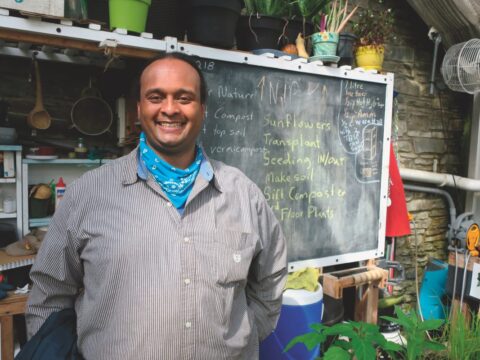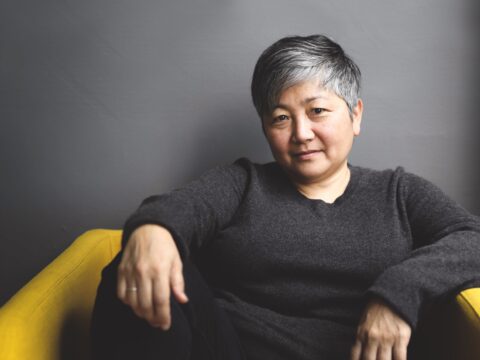I was in a meeting when one of my colleagues mentioned they had just come from a regional council gathering that approved the closure and disbanding of multiple communities of faith. The meeting continued on with its work, but that small piece of information stuck with me.
After logging off, I found myself sitting on my couch with tears pouring down my cheeks. My grief was overwhelming, almost paralyzing. I sat there, thinking about all of the people who had been part of those hard decisions: the people on the churches’ governing bodies, the congregations gathering for meetings, the ministers, the regional staff and the elected councils. Each person had their own connection to these communities of faith and their own myriad feelings about their ending, and needed to make the best possible decisions at a painful and difficult time. My love went out to all of them, and I offered prayers through my tears.
More on Broadview:
- How do we celebrate Easter during a pandemic?
- On Good Friday amid a plague, a hard truth emerges
- Easter is about more than just new life and hope
Although I can only imagine what it is like to have to make these decisions during a pandemic, every one of the communities of faith I have served over the course of my ministry has been affected by a closure, amalgamation or merger. One congregation had been formed by an amalgamation forced by the Presbytery 25 years earlier, and there were still hard feelings that had never been examined. Another’s membership grew when some of the country churches around the town decided to close their doors, which meant three distinct congregational cultures had to figure out how to do ministry together in one space. A third church hadn’t been looking for an amalgamation, but became something new when a sibling community of faith approached it with the possibility. And, often, as a representative from the local Presbytery, I walked with congregations who decided to bring their collective ministry to an end. While this meant helping the community of faith’s decision-making group in the practical work that had to be done, it also meant helping people say goodbye to a community, and often a place, that had been a vital part of their day-to-day lives.
For communities of faith, coming to the decision to disband or amalgamate is the epitome of the Lenten journey: walking with Christ, continuing to live and work and do ministry with him, even as the possibility of ending gets closer and closer, being faithful disciples all the way. I’ve learned many things about the process, but one of the biggest is that it hurts. No matter what possibilities lie ahead, there is an ending of something that has had a wonderful life: a community of faith that has served God to the best of its ability for many years.
When we are part of something ending, we often need to share stories about our grief. This kind of remembering often helps put into order what the person or thing we’re losing has meant in our lives. When a church closes, the community of faith needs opportunities to gather and remember. Just as crucially, though, their stories need to be shared with the wider church so they can be held in the collective memory of the whole United Church of Canada, and even in the collective memory of the entire body of Christ.
In that storytelling, it’s important to remember the baptisms and the professions of faith, the hymns and the beautiful shared meals. It’s important to remember gathering around Christ’s table, celebrating Christmas by candlelight, the covenants made in marriage or in ministry, the times we have said goodbye to beloved community members and the times we have shouted, “Christ is risen! Alleluia!”
It’s important to remember the clergy who have served with us in worship, in the community and in our homes; the Sunday school teachers with their books and games and crafts; and the pastoral caregivers who stopped in to see how people were doing. It’s important to remember the elders who served in the kitchen or with communion trays in their hands; the babies that have cried and cooed; the children who have danced down the aisle; the teens who challenged the rest of the community to put the words of faith into action; and the adults in their laughter, their arguments and their work.
We’re just beginning to understand the social changes that this time has made and what those changes mean.
It’s important to remember all of the ways we have lived out the ministry to which we have been called: the people who have been fed, the groups that have found support in the face of addiction, the works of justice that have been given life, even in the midst of our own brokenness and wandering.
But as essential as it is for us to grieve, it is just as essential for us not to be bound by that grief. What we human beings view as an ending is not what God understands to be an ending. This was clear that first Easter Sunday, in the fog of confusion experienced by the disciples who walked the road to Emmaus, in the silence that gripped those who gathered again in the upper room, or in the shock and wonder experienced by the women who went to prepare Jesus’ body for burial. They were expecting to be finished, but the risen Christ said to Mary from Magdala, Mary the mother of James, and Salome to tell the “disciples and Peter that he is going ahead of you to Galilee; there you will see him, just as he told you.” There is still work to be done, ministry to be lived and abundant life to be shared.
This Easter season finds us in a world that is continuing to live in the midst of a pandemic, even as vaccinations roll out, offering hope for an end in sight.
We’re just beginning to understand the social changes that this time has made and what those changes mean. In some ways, the restrictions on gathering pushed people to ask what their community of faith means, in their own lives and in the life of the wider community. It pushed many of us to look at what is central to what we do as United churches and think about how that ministry makes a difference in the world.
For some communities of faith, that learning will lead to changes in how they do their ministry. And, in some places, it will mean that a community of faith can’t continue as it is and needs to bring its ministry to an end.
No matter what these changes bring, we need to realize that Easter is not a hollow suggestion that everything will work out just fine. Easter, in fact, challenges us to continue to live our discipleship after something ends. It’s a challenge to come together and, as the United Church’s New Creed says, to continue “to be the church, to live with respect in Creation, to love and serve others, to seek justice and resist evil, and to proclaim Jesus, crucified and risen, our judge and our hope.” Because there is as much faith in our endings as there is in our beginnings and in our life together. As always, we need to trust that God is with us in these moments, as God has been with us in every moment of our lives as a community of Christ’s people.
I am certain that our spiritual grandparents, the ones who built our communities of faith generations ago, are urging us on and reminding us that the congregations they built live in us and in the way we live out Christ’s ministry, even after they close.
And I am just as certain that we will reach out to each other and find new ways of being Christ communities and living the challenge of Easter, remembering that in life, in death and in life beyond death, God is with us. We are never, ever, alone.
Christ is risen, indeed.
***
Rt. Rev. Richard Bott is the 43rd moderator of The United Church of Canada.
This story was first published in Broadview’s April/May 2021 issue with the title “Keeping the faith: an Easter message from the moderator.”
















I recall years ago being called and ask to preach for a church closing. It was the church my grandparents were married in and my father and 12 siblings were Christened there. I knew families of families that at one time worshiped there. I was heartbroken. It took a lot to choke back the emotions when I delivered the Benediction. I have since forgotten the passage I chose, but I do recall encouraging those who were there to press on in the faith, and to accept the challenge of God’s change of direction in their lives.
Thanks for letting me recall this, often we forget that God is in control, He doesn’t fret over situations, and He wants us to rely on Him at all times.
Broadview is an amazing publication which fulfills my need for continual guided nurturing on my Faith journey. I am stimulated in soulful, thoughtful ways which encourage my seeking heart and mind to pursue both personal and guided soul enrichment and Faith growth opportunities.
Thank You!
Unfortunately, interest in going to church and being part of a religious community is not something a lot of people today seem very interested in. I remember many years ago, in 1970, when the country UCC near where I lived closed and they came and joined our village UCC church. I went to the last service in May of that year and our S.S. class recited the 23rd Psalm. The people from the country church, to their credit, were excellent church members and contributed more than their fair share to the life of their new church. A number of decades ago, they wrote a book about their experiences, covering similar memories as the Moderator suggested about their country church. It was a fitting tribute to many people, including pioneer families who preserved a faith heritage and vibrant community. It is sad when this happens. However, sometimes it is not simply changing demographics or people moving away. Even in 1970, when those people who kept the church open talked about the sensible option of closing, the church would be close to full in response. The day to day work of being part of a faith community is both part of the challenge and responsibility of maintaining something important. When it is no longer viewed as important by the majority it will die. Hopefully the predictions of the demise of the UCC by 2040 or 2050 will not pan out. However, if people don’t act to preserve their faith communities and if it continues to be viewed by younger people today (especially Millennials) as relics from the past, than the UCC of today will probably not exist.
The Resurrection experience is finding life in the midst of death and despair. Destruction is not the end.